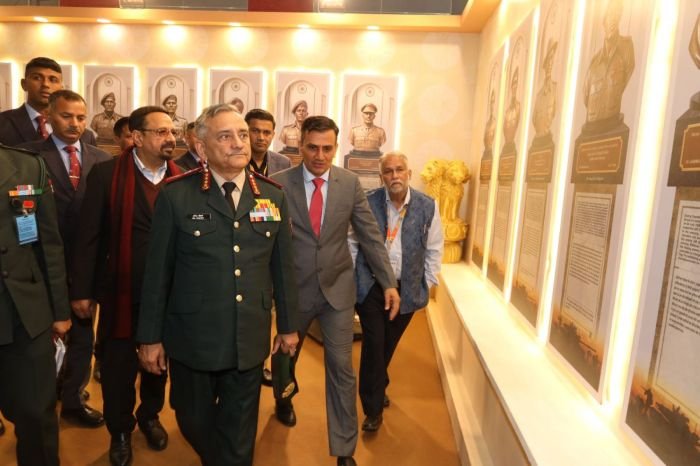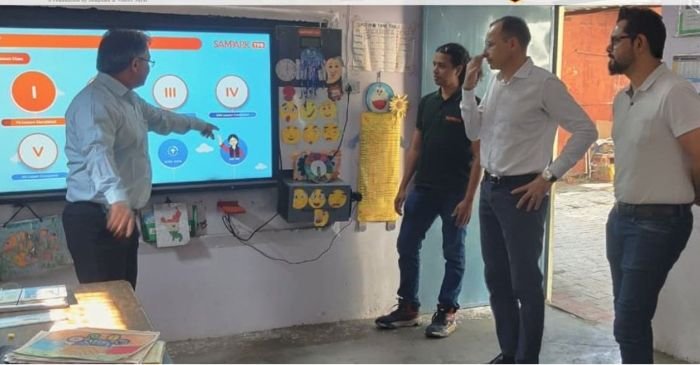
Pearson Voice of Teacher Survey 2014 findings out
In India, 50% of the students entering any class lack the required skills; Teachers (94%) consider skill and personality development as the most critical benchmark for measuring learner success. Teachers (92%) feel that the Indian education system is highly focused on ‘exam-oriented learning’ than ‘holistic learning.’ In driving the desired ‘learner outcomes’, teachers are least satisfied with support received from Parents (54%). These are some of the findings of the ‘Voice of Teacher Survey 2014′ commissioned by Indian subsidiary of the UK-based education products company Pearson and were released on September 3 in New Delhi.
The survey was conducted on 5145 teachers from schools and higher education institutes across 247 cities and towns in India by market intelligence consultancy, Spire Research and Consulting. The survey focused on the education system’s ability to drive learner outcomes and the challenges faced in achieving the same and teachers’ perspective on the changing dynamics of the ecosystem. Deepak Mehrotra, Managing Director, Pearson India, said, “With the current survey, our aim is to look at the learning environment in India, through the lens of teaching community.”
According to the survey report, 92% teachers believe that India’s assessment system, primarily, focuses on exam results. They consider skill and personality development (94%) as the most important benchmark for measuring learner success, followed by preparedness for higher education and job (83%) and lastly the test and exam results (57%). Teachers feel that half of the students (50%) entering a class or grade lack the skills (academic, cognitive and vocational) required for that level, signifying low orientation of the system on skill development. For achieving the desired learning outcomes, the survey reveals that teachers are least satisfied with the support they receive from parents (54%) and policymakers (55%). However the silver lining of the findings showed in teacher’s (79%) belief that the learning environment has improved over the past decade. The perception varies by segment/ level – school teachers view the changes more favorably (93%) vis-à-vis their counterparts in higher education (71%).
The survey also reveals that the teachers consider real-life and practical exposure (63%) as the key factor in driving learning outcomes, followed by technology integration into teaching (51%), training on new methodologies (49%) and improved curriculum and assessment framework (44%).
National Awards to 378 teachers
378 teachers were awarded the National Award on Teachers Day. The President also gave away the National Communication Technology (ICT) Award for the years 2010, 2011, 2012 & 2013. In all, 41 teachers (13 in the year 2010, 7 in the year 2011, 9 in the year 2012 and 12 for the year 2013) have been awarded with the ‘National Information Communication (ICT) Award for School Teachers.
Under the Scheme of National Award to Teachers , school teachers are selected for the award on the basis of their academic efficiency, desire for improvement in education, genuine interest in and love for children, involvement in social life and reputation enjoyed in the local community. The names of the teacher awards are recommended in the first instance, by the District Education Officer etc. on the basis of teacher’s record of work. It is further vetted by the District Committee. The recommendations of the Committee are scrutinised/ examined by the State Selection Committee which forwards its recommendations, in order of merit, to the State Government. The State Government in turn sends the same to the Union Government alongwith Character Certificate of faultless antecedents and absolute integrity duly signed by the State Education Secretary. The final selection is made by the Union Government. Each award consists of a Certificate of Merit, a Silver Medal and a Cash Prize of Rs. 25,000/-
On the eve of Teachers’ Day, the Central Board of Secondary Education (CBSE) also felicitated 33 teachers and mentors from across the country and abroad were conferred CBSE award for their innovations in classroom teaching. The selection of the awardees is based on the academic efficiency and desire for improvement, genuine interest and reputation in the community, love for children, perseverance and commitment towards the field of education. 15 Mentors were awarded for collaboration and handholding through regular visits to clusters of schools. The Mentor Awards recognise principals who go an extra mile in their endeavour to promote excellence. Mentors are selected on the basis of their training experience, professional guidance, positive role-modelling, collaboration with mentee schools and initiating innovative practices.
‘Theteachersdigest.com’ portal launched
KNEWCLEUS, an education management software solutions firm, recently announced the launch of its niche online magazine – theteachersdigest.com. The e-platform is designed to act as a Digital School for teachers across India and allow them to learn new skills, share best practices, experiences and opinions within their community and beyond. The Teachers Digest focuses on various teaching methodologies and modules deployed by teachers all over India, different facets of coaching and tips and tricks that they can utilize when teaching in order to inculcate a love for learning among their students. The magazine aims to create a community for teachers wherein they can share resources and knowledge with each other, participate in discussions, learn new skills and processes that would better the education system as a whole.
NSDC, NIOS come together for VET for secondary class students
National Skill Development Corporation (NSDC) and National Institute of Open Schooling (NIOS) have joined hands to provide vocational training to the students of Class 10 and Class 12. This is a first of its kind initiative in the skilling ecosystem in the country. The courses will be based on National Occupational Standards (NOS) set by industry through the respective Sector Skill Councils (SSCs).
NIOS students will be allowed to select one vocational course as part of their five subjects in Class 10th and Class 12th and get trained for the same. Marks scored by the student in this course will form a part of evaluation and mark sheet issued to the students by NIOS. Current NIOS students will also be able to participate in the scheme and enrol in a vocational course of their choice. They will be permitted to club this course with other 4 academic subjects to get NIOS 10th/12th certification.
At present the programme is launched as a pilot across 10-12 sectors in Delhi NCR covering 1, 00,000 NIOS students in the first phase. NSDC and NIOS today launched the pre-pilot phase with 4 sectors — security, retail, telecom and gems & jewellery. The training will be conducted at selected centres of NSDC training partners. NSDC partners participating in this initiative includes IL&FS Skills Development Corporation, Institute of Advance Security Training and Management and Empower Pragati. In 2nd phase of the project other sectors like Automotive, Agriculture, Beauty and Wellness, Healthcare, Tourism and Hospitality, Apparel and Home Furnishing, Plumbing etc. will be introduced.
Pearl Academy launches ‘Pearl Live’
After 20 years of educating professionals for the Creative Industries, Pearl Academy has launched its online education initiative – Pearl Live. Pearl Live offers Global E-Learning courses for working professionals, entrepreneurs and others interested in the creative industries who wish to enhance their skill-set and make a difference to their careers. To start with, Pearl Live is offering application based, 6 months and 9 months courses, which have been developed by Pearl Academy along with industry and international partners. Talking about their new venture, Sharad Mehra, CEO, Pearl Academy said, “There is a whole new generation out there of learners who know no boundaries and crave for quality learning. Amongst these learners rests a major chunk of working professionals who want to upgrade their skills and have that edge. Pearl Live is the answer to such section of learners. It offers high quality, interactive; outcome oriented and blended learning experience (mix of synchronous & asynchronous content). The course content has been developed in collaboration with reputed academicians from around the world and accomplished industry practitioners. Pearl Live is the next step in Pearl Academy’s commitment to Quality Education and the Creative Industries and we are really excited to launch our first 6 courses.”
NSDC signs a landmark MoU with Australia’s Department of Industry
National Skill Development Corporation (NSDC) and Australia’s Department of Industry, signed a landmark Memorandum of Understanding in presence of the Prime Ministers of the two countries on September 5 (Australian PM Tony Abbott was on a state visit to India) and committed to strengthen their already strong bilateral relationship in the area of technical vocational education and training (TVET). Under this MoU, the two countries will focus on the exchanging information and policy ideas on issues of mutual interest including TVET in both countries. The partnership includes the development of competency standards, assessment and certification, particularly skills assessments for migration and/or occupational purposes. The engagement also focuses on industry participation in TVET policy development, training delivery, assessment and certification, and formal work-based training such as apprenticeships.
By November 2014, the two countries aim to run a pilot around the same in the four sectors i.e. Automotive, Healthcare, IT and Telecom. The Sector Skill Councils and Industry Skill Councils, will work together to set a process to benchmark Indian and Australian Standards respectively, in order to create transnational standards for both the countries. Earlier in the year, between 21st to 25th July, a high powered delegation comprising representatives from NSDC, SSCs and NSDC training partners had visited Australia. The three visiting SSCs (Automotive, Healthcare and IT) signed MoUs with their Australian counterparts to create transnational standards in respective sectors at Canberra, while the MOU for the Telecom sector has been signed now during the visit Australian Prime Minister.
Pearson & Mart Collaborate For Skill Enhacement In Rural Trainers
Pearson, and MART, one of the renowned knowledge based consulting firms in India, have announced their partnership to execute a capacity-building project titled ‘Creation of Vocational Trainers in Rural India’ funded by UKIERI, the UK India Education and Research Initiative.








